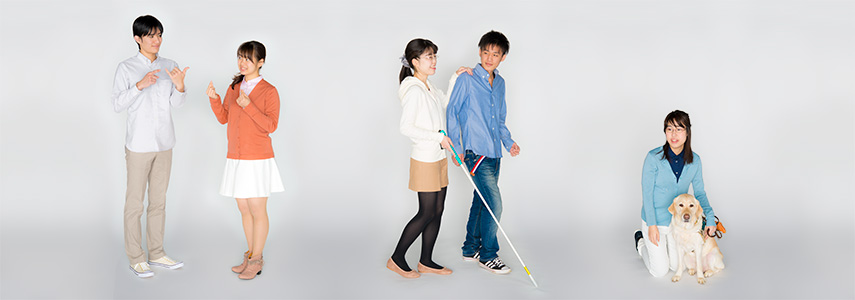
Primary Goals of the University
As Japan’s only institution for the higher education of hearing or visually impaired persons, the National University Corporation Tsukuba University of Technology (hereinafter referred to as “the university”) will further expand the knowledge and activities developed since its foundation and fulfill the following roles, with a focus on accepting and supporting people with disabilities as a national university that is a public good.
In education, the university will provide detailed education and support that are highly individualized to suit individual students’ disability characteristics and the developmental traits resulting from their disabilities. Through a curriculum that combines liberal arts, specialized fields, disability-related knowledge, and ICT skills, the university will also foster human resources who respond to rapidly changing industrial and occupational structures and contribute to the creation of diverse environments within society.
Through research, the university promotes not only research related to individual teachers’ specializations but also research to be developed through the integration of disability services and specialized fields. It also then returns the research results to society while leading research in the disability field.
This requires the development of an information support system for people with disabilities that is designed with attention to accessibility and the scientific verification and development of findings that have been accumulated through the university’s education programs. The university should then disseminate the research results to society to contribute to industrial and medical progress and should provide specific knowledge and technology for social changes to ensure that people with disabilities are not left behind.
Regarding social contribution, the university aims to use its experience of education and support for people with disabilities to increase the number of people with disabilities who are active in society and contribute to the creation of diverse environments across society. It will achieve this through activities such as recurrent education for working adults including people with disabilities, awareness-raising activities for people around people with disabilities, support for students with disabilities in other universities, efforts related to sports for people with disabilities, cooperation with special needs education institutions and other organizations, and assistance to older people.
For hearing or visually impaired persons who may be accepted by the university, the university should provide horizontal support for higher education institutions throughout Japan (such as support for university students throughout Japan), not just within the university, and vertical support for a wide range of people regardless of age (such as connection to special needs education and lifelong learning for working adults) and thereby play a key role in supporting hearing or visually impaired persons across the nation.
Regarding university management, the university should arrange and allocate human, material, and financial resources appropriately in line with these objectives and develop a system that enables appropriate evaluation of individual and organizational performance and achievements according to the medium-term objectives and plans. It is also necessary to strengthen the governance system under the president’s leadership and build a system for efficient and effective operation by streamlining the administrative chain of command – including the school committee – in terms of both field and function and trying to save labor.
Through these efforts, the university will foster individuals with disabilities who contribute to society and will contribute to the development of a society in which people with disabilities can demonstrate their abilities and play an active role.
